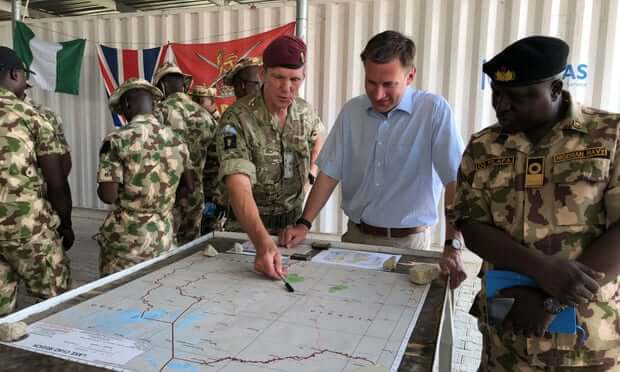Boko Haram: UK To Boost Military Support To Nigeria
The British government on Wednesday said it is considering a boost in military support to Nigeria to help the country defeat Boko Haram terrorists.
This, Britain said, is against the backdrop of the increased activities of insurgents in the country’s north-east in late 2018.
Advertisement
Jeremy Hunt, the UK foreign secretary, who recently visited Maiduguri the Borno state capital, promised to speak to the British government to increase its aid and military support to Nigeria to enable the country crush the dreaded sect.
Hunt warned that if not tamed, activities of Boko Haram in Nigeria’s north-east may cause a humanitarian catastrophe at a scale that was witnessed in Yemen.
According to reports, Britain is the second-largest donor of foreign aid to Nigeria after the United States. The UK government is said to provide £240m in aid to Nigeria out of which £100m goes to the north-east.
Speaking after his visit to the troubled region, Hunt said: “It has got all the hallmarks of something that if you do not nip in the bud, it will get a lot worse. Conversely, it feels like a situation that it is something that could be dealt with if there was appropriate action by the government of Nigeria with international support.”
Advertisement
He said the crisis had spread to Niger, Chad and Cameroon. “There is a potential solution here … Nigeria is huge country and it is very stretched,” Hunt added.
Asked if he supported an increase in military action in the region, the UK foreign secretary said: “I think the crucial deciding factor is the willingness and enthusiasm of the Nigerian government and the Nigerian army to work closely with us – we would like to support and help them, but they are a sovereign nation and they have got to want our help.”
Hunt said unlike Nigerian Army’s focus on ‘militaristic solutions’, the British government will bring an all-inclusive approach to combating the insurgents.
“I think our approach is potentially a very significant one, because we could bring not just the British army but also DfID [the Department for International Development] and our experience in holistic solutions to these kind of situations.
“This is a region of Africa that is being massively destabilised by conflict. These things can escalate quite quickly and get out of control. We know from Sri Lanka that Daesh [Isis] are looking to make their presence felt now they have lost their territory. We have to be vigilant.”
Advertisement
Hunt said unlike Sri Lanka that was attacked even though it wasn’t under threat, Nigeria was “an area where all the warning signs are there”
He added, “The feedback I got from NGOs on the ground is that lack of trust between the authorities and local people is one of the things that is fuelling the problem at the moment. The Nigerian army strategy is largely about herding people into towns and saying if you are not in a secure area, we are going to assume you are Boko Haram and/or Islamic State west Africa.
“Such an approach was understandable in the short term, but the long-term risk is that you are depriving people of their livelihoods and their farms. There are 2 million people displaced living there at the moment in pretty horrific circumstances.
“Both NGOs and military analysts fear the recent increase in violence reflects changes in the terrorist leadership, and a failure by the Nigerian military to establish humanitarian plans to follow the military clearances of areas. The brutal methods only lead to a loss of support for the military.”



